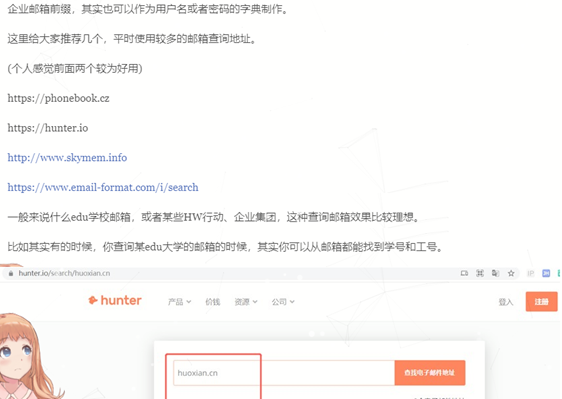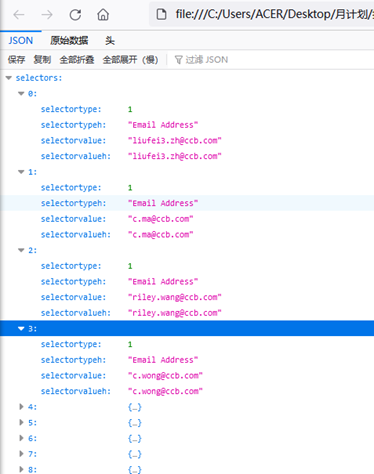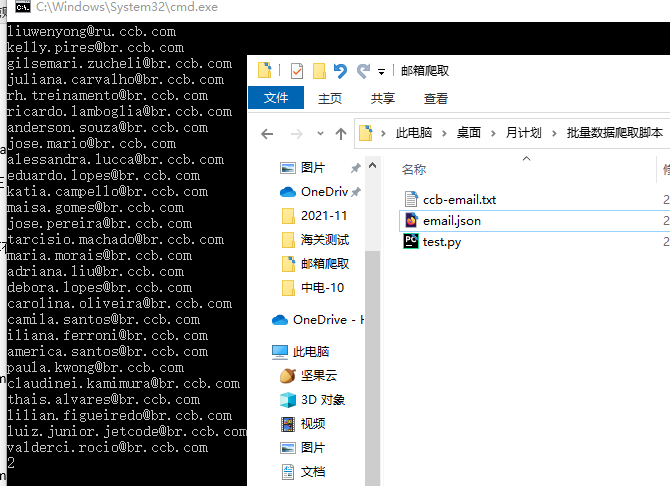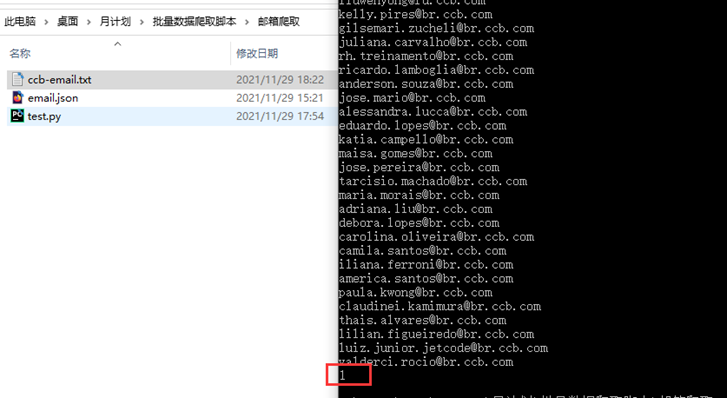在phonebook中获取邮箱json并把邮箱提取出来的脚本
题记
因为护网需要信息收集,邮箱也是很重要的点,有一次读到这里我决定尝试一下搜一下邮箱试试(这里以某银行为例)。

访问ccb.com响应了贼多邮箱,复制粘贴太麻烦了,很难粘。

查看F12发包过程发现网站查询的时候发了两个包,返回邮箱的数据包为json格式,经过考虑,一开始想用正则把邮箱爬出来,后来编写过后发现json解析更快,于是换种模式。(get新知识:json取值)

把json提取出来
把第二个result响应的所有json复制粘贴出来,保存为email.json。

用火狐打开json文件(可美化)看一下大概样子,要取哪些值。

我们要在selectors下取selectorvalue值。
核心代码
此代码为在selectors下取selectorvalue值。
with open('email.json') as f: data = json.load(f) for tag in data["selectors"]: mm=tag["selectorvalue"] print(mm) with open(r'guodu.txt', 'a+', encoding='utf-8') as f: f.write(mm + '\n') f.close()
操作美化与功能完善
因为取值很简单,又怕写完以后就彻底不用了,决定完善一下,
1、为区分一下文件,采用sys取参数与email.txt进行拼接命名。
2、每次启动清空guodu.txt文件往里写东西。
3、解析完邮箱判断以前爬的文件名是否存在,存在就删掉在改名为$host$-email.txt,不存在就直接改名为$host$-email.txt
最终代码:
# coding=gbk import json import os import sys from pprint import pprint def result(): with open('email.json') as f: data = json.load(f) for tag in data["selectors"]: mm=tag["selectorvalue"] print(mm) with open(r'guodu.txt', 'a+', encoding='utf-8') as f: f.write(mm + '\n') f.close() if __name__ == '__main__': #判断是否有参数,没有退出 if len(sys.argv) != 2 : print ('usage:python test.py host') sys.exit(1) #每次启动时清空1个txt文件 if os.path.exists("guodu.txt"): f = open("guodu.txt", 'w') f.truncate() #文件名字为$host$-email.txt filename=sys.argv[1]+"-email.txt" print("最后保存的文件名为:"+filename) #在json文件获取邮箱字段,保存在guodu.txt中 result() #判断文件名是否存在,存在就删掉在改名为$host$-email.txt,不存在就直接改名为$host$-email.txt if os.path.exists(filename): print(1) os.remove(filename) os.rename('guodu.txt', filename) else: print(2) os.rename('guodu.txt', filename)
操作记录(用于自己回顾)
python test.py

python test.py ccb(第一次生成这个文件ccb-email.txt)

python test.py ccb(第二次生成这个文件ccb-email.txt,因为文件存在就删了以前的,在改名)



 浙公网安备 33010602011771号
浙公网安备 33010602011771号